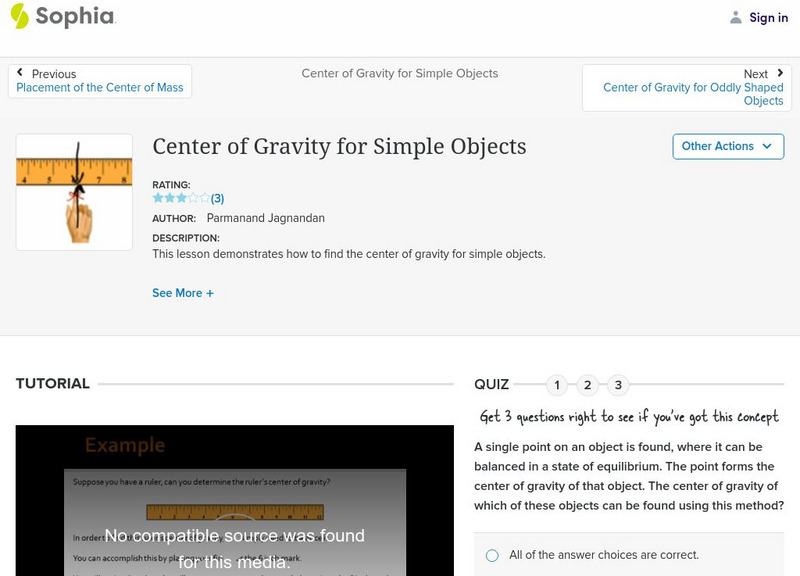SciShow
Why Do Flamingos Stand on One Leg?
It seems like kind of an awkward way to spend most of your time, but flamingos seem perfectly happy to hang out on one leg. For a long time, people assumed they were trying to conserve heat. But thanks to some unusual research, we now...
Bozeman Science
Center of Mass
In this video Paul Andersen explains how the center of mass of an object represents the average position of matter in an object. The center of mass of a system is a combination of all the objects within the system. As long as no external...
Curated Video
Finding Centre of the Mass of a Ruler
We are trying a fun way to find the centre of the mass of a ruler. If you hold your index fingers in front of you, put a ruler on top of them and start moving your hands towards each other, your fingers end up right at the unique point...
Curated Video
Science Experiment: Balancing Potato
It might seem impossible to balance a potato on top of a bottle, but we took skewers and pieces of carrots and moved the centre of mass just right.
Flipping Physics
Throwing a Ball in a Boat - Demonstrating Center of Mass
When I throw a massive ball to the left such that it lands in the other end of the canoe, what will happen to the positions of the objects? What if the ball does not land in the canoe?
Flipping Physics
Center of Mass of an Irregular Object
How to find the center of mass of an irregularly shaped, flat object.
Flipping Physics
Center of Mass of an Object with a Hole
How to find the center of mass of an object with a missing piece.
Flipping Physics
Calculating the Center of Mass of a System of Particles
Three point objects are located at various locations on a Cartesian coordinate system. Mass 1, with a mass of 1.1 kg, is located at (1.0,1.5) m. Mass 2, with a mass of 3.4 kg, is located at (3.0,1.0) m. Mass 3, with a mass of 1.3 kg, is...
Flipping Physics
Center of Mass Introduction
Center of mass is defined and demonstrated in projectile motion. We demonstrate what happens when you push at or near the center of mass. The center of mass of a Feeble is demonstrated. And the “Hang Test” is used to find the center of...
Scholastic
Study Jams! Gravity & Inertia
Is it possible to defy gravity? Not really. With force and inertia, we can act against it for a little while, but, eventually, gravitational force will pull us back to Earth. The relationships among mass, force, and inertia are all...
Bill Nye
Bill Nye The Science Guy on Balance
LOL! Hazel Fanny, the Science Granny is hilarious and educational! After Bill rides a sky-high bicycle, demonstrating the center of gravity, this elderly woman and her girlfriends play tug-of-war with a gang of bikers to display what...
PBS
Pbs Learning Media: Center of Gravity: Pencil Balance
Watch the ZOOM cast learn about center of gravity by trying to balance a pencil on their fingers and noses. [3:36]
NASA
Nasa: Weight and Balance: Lesson 2
This video shows how the center of gravity on an airplane is determined, where it is located, and why it's important for maintaining balance. Watch as computers on the aircraft redistribute weight of fuel on an airplane to help maintain...
PBS
Wnet: Thirteen: Circus Physics: Center of Mass
Standing on your tiptoes is hard enough, but imagine trying to do it while staying balanced on top of someone else's head. To keep balanced, the Nanjing acrobats must be aware of their centers of mass, and the various forces -- called...
Bozeman Science
Bozeman Science: Gravitational Forces
Award-winning science teacher Paul Andersen helps make physics understandable as he explains how gravitational forces differ from the other three fundamental forces: electromagnetic, and strong and weak nuclear forces. [5:05]
National Science Foundation
National Science Foundation: Science of Speed: Load Transfer
The corners of a NASCAR track are divided into three parts because the car's grip changes in different parts of the turn. A race crew must try to minimize load transfer by making adjustments based on a car's centre of gravity. [5:05]
National Science Foundation
National Science Foundation: Science of Speed: Balance
Getting the right balance in a race car is difficult because the weight of the fuel changes as the fuel burns off, and the tires wear down during each green-flag run. [5:16]
Khan Academy
Khan Academy: Torque, Moments and Angular Momentum: Center of Mass
An introduction to the center of mass. [9:35]
Sophia Learning
Sophia: Center of Gravity
Learn how physicists define the term, center of gravity, and how it differs from center of mass. [1:13]
Sophia Learning
Sophia: Stable vs. Unstable
A narrated screencast explains the concept of stability in objects. [3:16]
Science for Kids
Science Kids: Sports Videos: Basketball Hang Time
Do some athletes have the ability to hang in the air longer than other people? Watch to see whether hang time really exists and how the mechanics of jumping work. [6:27]
Sophia Learning
Sophia: Center of Gravity for Oddly Shaped Objects
This lesson demonstrates how to find the center of gravity for oddly shaped objects.
Sophia Learning
Sophia: Center of Gravity for Simple Objects
This lesson demonstrates how to find the center of gravity for simple objects.











